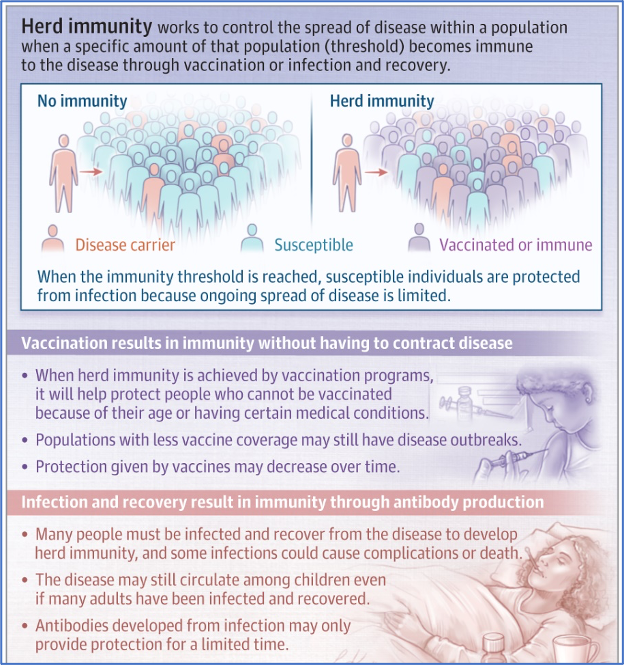How do vaccines work?
Vaccines provide protection against diseases. Our immune system fights off infection naturally through antibodies produced by the body. When the body is first exposed to the disease-causing pathogen, the body creates antibodies against it. If it is exposed to the same pathogen again, the body has a memory of the pathogen and can use the required antibodies to fight it off more effectively. Vaccines provide the initial stimulus for the body to create specific antibodies against particular pathogens. That way, the body can store the memory of those antibodies if that pathogen is ever encountered. The World Health Organization (WHO) has more information on vaccines and how they work.
Why are vaccines required in school?
Vaccinations protect your child and other children from acquiring potentially life-threatening diseases. That’s why they’re required to attend school in Ohio.
In 2019, the largest measles outbreak since 1992 occurred across 31 states — after it had been considered eliminated by the year 2000 in the United States. It was started by an unvaccinated child who traveled to a foreign country and contracted the disease. When returning to the States, he spread it to pockets of unvaccinated New York City communities. Of those affected, 81.2% were 18 years old or younger. More than 85% of them were unvaccinated. Severe complications included pneumonia and hospitalization. For more information about the measles outbreak, visit this site.
That’s just one example of the importance of vaccines to stop the spread of a potentially life-threatening disease. This is called herd immunity, which occurs when the immunity gained from vaccinations as a community can protect the minorities who are not able to receive it. Children not able to receive it include those who:
- Are immunocompromised and not able to take certain vaccines,
- Have allergies to vaccine components, or
- Are too young.
The proportion of the population that must be vaccinated for herd immunity to take effect differs between diseases. For a highly contagious virus like measles, almost all of the population must be vaccinated (95%) for herd immunity to take effect. Other diseases are around 70-80%.

Learn more about herd immunity from Kids Health.
For more information about the required vaccines for Ohio schools, click here.
Source: https://jamanetwork.com/journals/jama/fullarticle/2772168
What are the different types of vaccines?
Inactivated Vaccine: This type of vaccine contains the killed version of the pathogen, which cannot cause disease. However, the body’s immune system can recognize it and produce antibodies against it. Because it isn’t an active virus, this approach can require multiple booster shots to obtain an effective level of immunity (e.g. the polio vaccine).
Live Attenuated Vaccine: These vaccines contain a live but weakened pathogen. It cannot cause disease. However, children with weakened immune systems should take caution. A live attenuated version is longer lasting and provides stronger immunity against the pathogen. Examples include MMR (measles, mumps, and rubella), chickenpox, and rotavirus vaccines.
mRNA Vaccine: This vaccine contains the blueprint of the virus’ proteins — not a live or inactive version of the disease. Since the live virus is not present in this vaccine, it cannot cause disease (e.g. most COVID-19 vaccines).
Toxoid Vaccine: Used for pathogens that release toxins that cause the disease, this vaccine contains a part of that toxin to fight them. It cannot cause disease because neither the pathogen or whole toxin are present in the vaccine. Diphtheria and tetanus vaccines are examples of this vaccine.
Other Vaccines: Subunit, recombinant, polysaccharide, and conjugate vaccines are other types of treatments. They introduce only one part of the pathogen to the body. Since the whole pathogen is not present, it cannot cause disease. Examples of such vaccines are Hib, Hepatitis B, HPV, pertussis (part of DTaP), pneumococcal (PCV13), and meningococcal vaccines.
For more information, visit https://www.hhs.gov/immunization/basics/types/index.html
Do teenagers need to be vaccinated?
In short, yes. Meningococcal and Tdap vaccines should be given at around 11 years. The HPV vaccine, which consists of 2 doses, should be started around 9 years. The flu vaccine should be given every year starting at 6 months. Lastly, the COVID-19 vaccine should be given as soon as your child is old enough.
Teenagers are exposed to a large number of people in school and at extracurricular activities — and their germs. Keeping your teens updated on their vaccinations helps protect them and your family.
For more information, visit HealthyChildren.org.
How long does immunity last after getting a vaccine?
Vaccines provide immunity anywhere from a few months to a lifetime. The main reason why it varies by vaccine type is the replication rate of the pathogen. For example, the Hepatitis B virus reproduces very slowly, so the Hep B series that children will get around the time of their birth will protect them for life. This is the same for the polio vaccine series. The TDaP booster, however, should be given every 10 years. The influenza vaccine reproduces very quickly — creating new variants every year. Therefore, a flu shot is required annually.
Read more about this topic at https://www.cedars-sinai.org/blog/why-vaccine-boosters.html
Why vaccinate against diseases that occur in other countries?
We live in a globalized time with people traveling to different areas of the world increasing the likelihood of spreading disease. The popularity and necessity of travel continue to grow, and that enhances the need for more vaccinations. A recent example is COVID-19. It originated in China, but it became a global pandemic, infecting people worldwide.
How are vaccines studied and improved?
Vaccine creation and development generally take 10-15 years to complete. It’s regulated by public policy and private entities.
Testing of vaccinations occurs in stages. To start, basic lab research on the pathogen and the antigen takes 2-4 years. Then, the vaccine progresses to being tested on animals or human tissue. If the vaccine passes this stage, it progresses to clinical testing. During this stage, the vaccine goes through several phases. The vaccine is approved for licensure only after all phases are determined successful. It will be improved periodically if necessary. Learn more about the history of vaccines.
Common concerns about pediatric vaccines
Can my child get the disease with the vaccine?
Vaccines cannot cause disease because they do not contain the live version of the pathogen. Here are examples of types of vaccines that your child may receive and what they contain. For more information, visit https://www.hhs.gov/immunization/basics/types/index.html.
Is administering multiple vaccines at the same time hard on my child’s immune system?
In short, not typically. There is very little evidence that multiple vaccines in combination can cause any illness other than an occasional fever. Vaccines received in combination are just as effective when received separately. There are several vaccines given in combination. Examples include DTaP (diphtheria, tetanus, and pertussis), MMR (measles, mumps, and rubella), and IPV (3 strains of polio).
A child may get multiple vaccines during the same doctor’s visit. The advantage being the quicker children can get vaccinated, the quicker they gain immunity against the illness. It also helps reduce trips to the doctor’s office and minimize costs.
For more information, visit https://www.cdc.gov/vaccinesafety/concerns/multiple-vaccines-immunity.html.
Where can I get affordable vaccines for my child?
Most health insurance plans cover vaccinations for little to no cost. Click here to find out what vaccinations your insurance plan covers. If you don’t have insurance or the vaccination is too expensive with insurance, the Vaccine for Children Program will may provide be an option. Children under 19 may qualify if they meet certain requirements. Learn more on the Ohio Department of Health website.
Are vaccine ingredients toxic?
All vaccine ingredients are safe in the dosage they’re provided in vaccines. The following includes details about some ingredients, however, to be aware of:
- Adjuvants are added to vaccines to enhance the body’s immune response to the vaccine. It is commonly found in baby formula, antiperspirants, and even drinking water. Vaccines that are adjuvanted can create some local side effects (pain, redness and swelling at the injection site) and systemic side effects (body aches, chills and fevers). The side effects are very limited and do not cause any chronic illness.
- Some vaccines contain trace amounts of formaldehyde, which is used to kill or inactivate the pathogen in the virus. The formaldehyde is diluted to a large extent and is very small compared to the amount of natural formaldehyde already created in the body.
- Vaccines may contain egg proteins. They’re used to grow enough of the pathogen to make the vaccine. This ingredient might be of concern if your child has an allergy to egg products. If this is the case, contact your family care provider for more information about alternative options.
- Parents might be concerned about thimerosal, which is present at low doses in vaccines. It’s a mercury-based preservative used to prevent vaccine contamination. However, it is a different form of mercury (ethylmercury) than the one that causes mercury poisoning (methylmercurcy). Ethylmercury is quickly eliminated from the body and, therefore, causes little to no side effects.
Are vaccines safe for my child?
All recommended pediatric vaccines are safe for children. There are rare cases where a child could have an adverse reaction to a vaccine. If your child has a specific allergy or is immunocompromised, contact your child’s primary care provider first.
Every vaccine can have side effects, but they typically last for a couple of days at most. The common side effects from vaccines include soreness at the site of injection, fever, feeling tired, fussiness, vomiting, or loss of appetite. COVID-19 vaccine side effects for children can include soreness at the site of injection, sleepiness, headaches, chills, swollen lymph nodes, etc. Although very rare, more serious reactions such as seizures and high fevers may occur. For more information about specific vaccine side effects, look at the Vaccine Information Statements at https://www.cdc.gov/vaccines/hcp/vis/current-vis.html.
I refuse vaccines for my child for religious reasons.
For some, refusal of vaccinations may be due to religious reasons. The most common reason is that vaccines often use embryonic tissue for testing, or the vaccine itself may contain some embryonic tissue. For some vaccines, there are alternatives available. Voice any religion-related concerns to your child’s physician, and they may be able to work with you to find other solutions.
My child’s physician is not easy to talk to.
For any concerns you may have about immunizations, your child’s doctor will be your best resource. If you find it difficult to communicate in the moment with the physician, there are steps you can take. Before your appointment, come prepared with a list of concerns and/or questions. If you need clarification, don’t hesitate to ask for it. You might also ask the nurse questions. Get their contact details in case you have questions after the appointment.
For more vaccine information, visit https://www.cdc.gov/vaccinesafety/concerns/index.html.
Myths about vaccines
Can vaccines cause autism?
There is no evidence linking vaccines to autism. Several studies have explored this myth. One such study by the CDC explored the number of antigens that a vaccine gives to children (antigens help the body develop antibodies to fight disease). The number of antigens did not differ between children with and without autism. An additional study by The National Academy of Medicine reviewed the safety of 8 different vaccines and determined that they are all very safe with rare exceptions. None of these exceptions include developing autism.
Parents might be concerned about the ingredients that some vaccines contain. Thimerosal is a mercury-based preservative that is used to prevent the contamination of vaccines. Several studies have found no link between thimerosal in vaccines and autism.
For more information, visit https://www.cdc.gov/vaccinesafety/concerns/autism.html
Is natural immunity better than vaccine immunity?
Many people might wonder if the vaccine is necessary if their children had an illness, like COVID-19. In the case of COVID-19, research has shown that getting the vaccine despite already having it greatly increases immunity against the virus and reduces the risk of another infection. Those without the vaccine are two times more likely to get COVID again compared to those with the vaccine. (Source: Johns Hopkins)
Many vaccines protect against diseases that would otherwise be life-threatening (such as polio, Hepatitis B, etc.). Some diseases, such as whooping cough (pertussis), might not be as life-threatening for adults, but in children, it can become very serious. As a result, vaccine immunity against these diseases is the only option for children.

